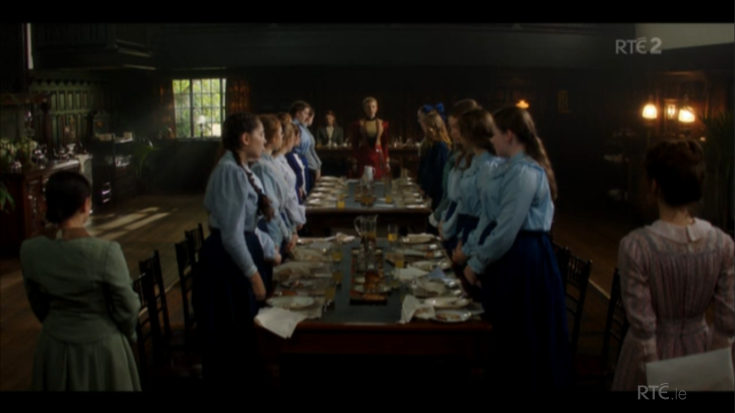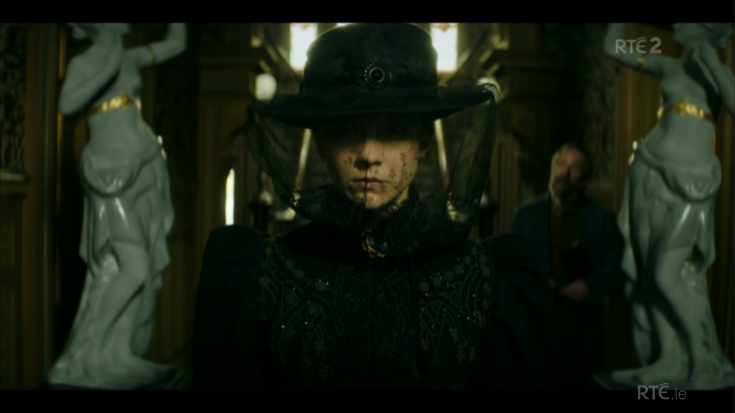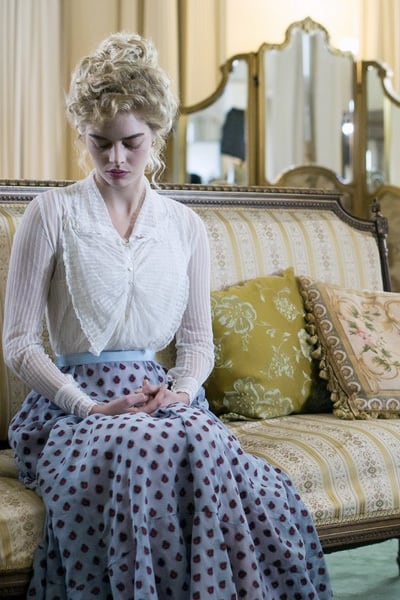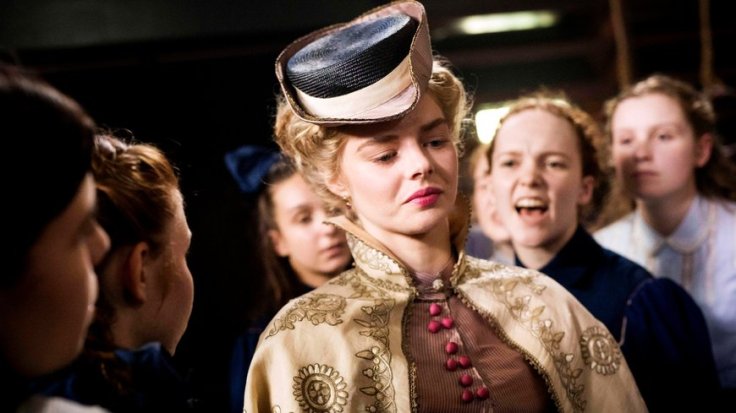In the late summer of 2018, RTÉ 2 aired the Australian set period drama Picnic at Hanging Rock. An adaptation of Joan Lindsay’s 1967 novel of the same name, the six-part series tells the story of the disappearance of three schoolgirls and their teacher in 1900 Australia. This is the second major screen adaptation of Lindsay’s novel, after Peter Weir’s celebrated 1975 film. The series as a whole is imbued with a sense of mystery and foreboding, exploring themes such as repressed sexuality, female conflict and friendship, physical and psychological abuse, the supernatural, colonialism and identity.
In the world of Picnic at Hanging Rock, a young woman’s identity and value are shaped by expectations around personal appearance and conduct. In the previous article, I looked at the role of costume in the series, focusing on the importance of clothing in shaping an individual’s identity. In this article, I will explore how the female characters personal value is determined based on both their outward appearance and reputation, while also looking at the inherent contradictions in this society’s expectations of its young women.

In Picnic at Hanging Rock we are introduced to Appleyard College, a school for girls from ‘respectable’ families, run by the formidable Hester Appleyard. As a school for young ladies, Appleyard College has built its curriculum around shaping its pupils into ideal future wives. The school’s motto, purity and refinement, sums up the college’s ethos. Hester believes that the best education she can offer the girls is to ensure that they maintain both a pristine exterior and an unblemished reputation. In the series, we are shown the innate contradiction in what is expected of the students. While they are being bred to appear completely pure and innocent, they are essentially being groomed as sexual objects. They are expected to maintain an appearance of unquestionable virtue while also selling themselves as attractive marriage prospects.

Hester draws attention to this contraction when she first sees the statues of naked women at the entrance of the house. She dryly notes that “there are always naked tits in the finer establishments.” As an outsider, Hester can recognise the hypocrisy at the core of the upper-class society she has infiltrated. A society that rejects any display of sexuality, while raising its young women to base their sense of self-worth on their attractiveness to men. This contraction is later evoked when Hester chooses to keep the statues in her school but drapes signs with the words ‘purity’ and ‘refinement’ over their bosoms.
In the world of Picnic at Hanging Rock purity is an essential part of a young woman’s identity that must be protected at all costs. Any threats to a woman’s virtue could seriously alter a girl’s marriage prospects and standing in society. On the way to the picnic, French teacher Dianne reminds her students that “a lady is given only one complexion. She must protect it.” This principle can also be applied to a young woman’s reputation, once blemished in any way it cannot recover. This is particularly evident in the portrayal of Miranda’s sexual assault. During the fete at the governor’s house, Miranda finds herself alone with a drunk soldier who attempts to assault her. Miranda manages to fight him off by stabbing him in the foot with a pitchfork, just before Hester enters the scene. The way that Hester chastises Miranda after the incident highlights how unfairly sexual assault victims in this period and society are treated. Rather than seeing Miranda as a victim, Hester scolds her, reminding her of the damage that this incident could have on her reputation. Hester even states that if Miranda had been raped, she could have been obliged to marry her attacker. This incident shows how fragile a woman’s reputation in this society is.

An issue at the core of Picnic at Hanging Rock is the poor standard of education offered to the girls. The school’s curriculum is dedicated to ensuring that its pupils learn to conform to a late 19th century British ideal of femininity. In Dora Lumley’s deportment class, the girls are taught how to present themselves in polite society. Although some students, like Marion Quade, manage to flourish intellectually within the school, it is clear that many aspects of Appleyard College’s curriculum are woefully lacking. There is a lack of any kind of sexual health education, shown in Edith’s distressed reaction to her first period. Heavy focus is placed on how the girls present themselves to the world, and severe punishment is doled out to girls who behave in an unladylike way. Miranda frequently finds herself scolded and punished by Hester for her ‘tomboyish’ behaviour. One particularly cruel punishment utilised by Dora Lumley is the ‘posture board’ that she straps her young students in to for prolonged periods. This form of discipline is frequently used against Sara, a highly intelligent, but stubborn and defiant, young student.
Elegant, beautiful and refined, Irma Leopold is presented as the ideal Appleyard College lady. A wealthy heiress raised in European society, Irma is very aware of what is expected of a young woman like her. She pays careful attention to her appearance and conduct, and from the way she presents herself it is clear that she is used to being observed and admired. Irma associates femininity with self-control and restraint. She carefully controls her diet, stating that “a lady must never eat her fill.” She demonstrates great self-restraint in how she hides her feelings of insecurity and disappointment, managing to maintain a well-controlled outer appearance at all times. Irma’s personality and behaviour can be contrasted with that of Sara, who is often tormented and punished by Hester. While Irma tries desperately to hide her true emotions, Sara shows no such restraint. Sara’s problem with self-harming can be read as a determination by her to wear her pain on the outside. While Irma hides her suffering, Sara displays it.

The failure of Hester Appleyard’s school can be attributed to its inability to prepare the girls for the dangers of the outside world. The physical space of the school, with its gates and high walls, seems to offer the girls protection from the outside world. The school is seen as a place for the girls to safely pass the time between childhood and marriage. The disappearance of the girls at the picnic shatters the illusion of protection offered by the school. As the days pass by with no news of the missing girls, conditions within the school begin to deteriorate. Concerned parents start withdrawing their children from the school, and members of staff decide to leave or are fired by Hester. Hester’s mental state begins to suffer, with her becoming increasing paranoid and erratic. After weeks of searching, Irma is the only one of the missing women who is found. Even though Irma is found safe, she is deeply distressed by her experience and is unable or unwilling to remember what happened to the other women at the Rock. After her rescue, she expresses her disillusionment with the school, believing that it did not offer her any protection or preparation for what happened to her, Miranda, Marion and Miss McCraw at the Hanging Rock.
Irma’s reputation appears tainted by the experience. An air of suspicion surrounds her, and the other students begin to turn on her, believing that she knows where the other missing women are. When Irma returns to the school, she is confronted by the other students, who mob her and angrily question her about the whereabouts of the other missing women. Even though she has survived, she is still deeply shaken by her experience. In the aftermath of her rescue, Irma’s mental state is shown to be very fragile, and her restrained lady-like façade begins to crack. She becomes deeply attached to Michael Fitzhubert, the young English aristocrat who took part in her rescue. After becoming convinced that he will propose to her, Irma is left devastated when he does not reciprocate her romantic feelings.

A reoccurring theme in the series is the impossibility of a woman escaping her past. One thing that Hester and Irma have in common is that they are both trying to hide events in their lives that could damage their reputations. Although Hester has managed to establish a new life and identity for herself in Australia, she still has to live in constant fear of her lies being exposed. The audience never knows if Irma’s amnesia is real or faked, but she will always be haunted by what happened to her and the other women. Hester reminds her off this in their last meeting, telling Irma,
“You’re a perfect peach, but secrets are like worms. Greedy, greedy feeders. Imagine how disappointed your betrothed will be to find that perfection in hollow and rotten on the inside.”
Ultimately the tragedy at the centre of the series is the failure of the school to protect its students. By focusing on moulding her students into ideal future wives, Hester has paid little attention to preparing the young women under her care for the darker aspects of life. The disappearance of the women at the Hanging Rock can be seen as a representation of the way that the school has failed to prepare its students for the outside world.
Credit for cover photo to radiotimes.com.
Other images to rte.ie, frockflicks.com, bradfordzone.co.uk.

Leave a comment